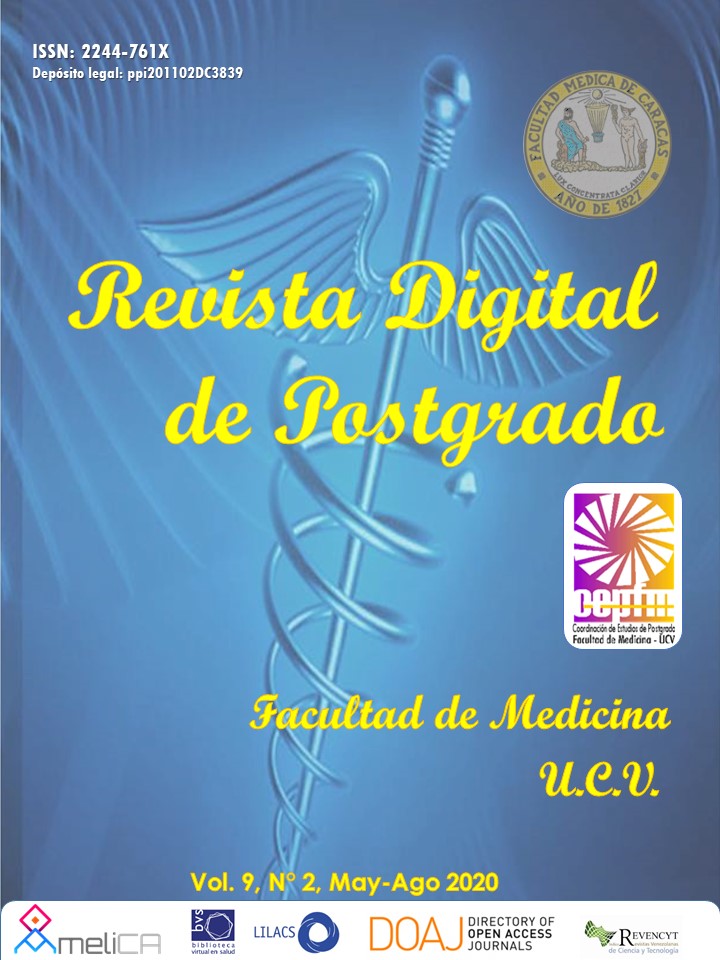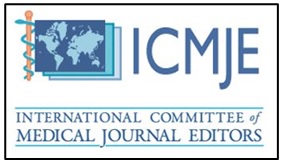Effect of the pharmacological management of the autonomic nervous system in the acute pancreatitis induced by the venom of Tityus zulianus scorpion in an ex vivo model
Keywords:
Envenenamiento escorpiónico, Tityus zulianus, pancreatitis aguda, Sistema Nervioso Simpático, agonistas adrenérgicos.Abstract
Introduction: Pancreatitis is one of the main consequences of scorpionic poisoning produced by the genus Tityus. The pharmacological management through the use of agonists and α adrenergic antagonists in experimental models in vivo and in vitro, allow us to establish an approximation of the role of the Sympathetic Nervous System (SNS) in the development of pancreatitis. Objective: to determine the role of SNS in the development of acute pancreatitis induced by the scorpion venom Tityus zulianus (TzV), through the use of sympatholytics such as clonidine and prazosin. Methods: Plasma Protein Extravasation (PPE) in the pancreas was evaluated by the method of Evans Blue (EA), modified by Saria and Lundberg (1983) at 620 nm; n = 3 NIH mice in each experimental group. Comparisons were made by one-way ANOVA and post-HOC tests by Tukey-Kramer. Results: Both drugs (1mg / Kg) significantly decreased p <0.01 (**) the EPP in the pancreas induced by TzV, compared to animals inoculated only with TzV. There were no significant differences between the animals in the control group and the groups treated with drugs plus TzV. Conclusions: The pancreatotoxic effect of TzV in mice could have an autonomic component since sympatholytic drugs by decreasing noradrenergic activity reduce the magnitude of edema. This suggests that both drugs can be used as a therapeutic strategy in these cases.Downloads
References
Bartholomew C. Acute scorpion pancreatitis in Trinidad. Br Med J. 1970; 1(5697): 666–668.
Bartholomew C, Mueohy JJ, McGeeney KF, Fitzgerald O. Exocrine pancreatic response to the venom of scorpion Tityus trinitatis. Gut. 1977; 18(8): 623–625.
Borges A, Trejo E, Vargas AM, Céspedes G, Hernández A, Alfonzo MJ. Pancreatic Toxicity in mice elicited by Tityus zulianus and Tityus discrepans scorpion venoms. Invest. Clin. 2004; 45(3):269-76.
Trejo E. Mecanismos moleculares asociados a la pancreatitis producida por los venenos de los escorpiones Tityus discrepans y Tityus zulianus: Modelos experimentales [tesis doctoral]. Caracas – Venezuela: Universidad Central de Venezuela; 2007.
Trejo E, Borges A, González de Alfonzo R, Lippo de Bécemberg IA, Alfonzo MJ. Tityus zulianus and Tityus discrepans venoms induced massive autonomic stimulation in mice. AVFT 2012; 31(1): 1-5.
Trejo E, Borges A, Ñañez B, Lippo de Bécemberg I, González de Alfonzo R, Alfonzo MJ. Tityus zulianus venom induces massive catecholamine release from PC12 cells in a Mouse envenomation model. Toxicon. 2012; 59(1):117-23.
Borges A, Trejo E, Vargas AM, Céspedes G, Hernández A, Alfonzo MJ. Pancreatic Toxicity in mice elicited by Tityus zulianus and Tityus discrepans scorpion venoms. Invest. Clin. 2004; 45(3): 269-76.
Mazzei CA, Dávila DF, Donis JH, Arata GA, Villareal V, Barboza JS. Sympathetic nervous system activation antivenin administration and cardiovascular manifestations of scorpion envenomation. Toxicon. 2002; 40(9):1339-46.
Saria A, Lundberg J. Evans Blue Fluorescence quantitative and morphological evaluation vascular permeability in animal tissue. J. Neurosci Methods.1983; 8(1):41-9.
Bawaskar HS, Bawaskar PH. Prazosin therapy and scorpion envenomation. J Assoc Physicians India. 2000; 48(12):1175-80.
Bawaskar HS, Bawaskar PH. Efficacy and safety of scorpion antivenom plus prazosin compared with prazosin alone for venomous scorpion (Mesobuthus tamulus) sting: randomised open label clinical trial. BMJ. 2011; 342:c7136.
Lechín F, Van der Dijs B, Lechín M, Jara H, Lechín A, Cabrera A, Rada I, Orozco B, Jiménez V, Valderrama T. Clonidine treatment of acute pancreatitis: report of five cases. Acta Gastroent. Latinoamer. 1992; 22(2):119-24.
Lechín F, Van der Dijs B, Lechín M, Jara H, Lechín A, Cabrera A, Rada I, Orozco B, Jiménez V, Valderrama T. Dramatic improvement with clonidine in acute pancreatitis with elevated cathecholamine and cortisol plasma levels: report of five cases. J Med. 1992; 23(5):339-51.
Rodríguez A, Zerpa H, Ruiz A, Bermúdez V, García F, Silva A, Gutiérrez L, Villamil S. Effect of clonidine in mice injected with Tityus discrepans scorpion venom. Toxicon. 2013; 63:70-7.
How to Cite
Issue
Section
License
Usted es libre de:
- Compartir — copiar y redistribuir el material en cualquier medio o formato
- Adaptar — remezclar, transformar y construir a partir del material
- para cualquier propósito, incluso comercialmente.
Bajo los siguientes términos:
-
Atribución — Usted debe dar crédito de manera adecuada, brindar un enlace a la licencia, e indicar si se han realizado cambios. Puede hacerlo en cualquier forma razonable, pero no de forma tal que sugiera que usted o su uso tienen el apoyo de la licenciante.
- No hay restricciones adicionales — No puede aplicar términos legales ni medidas tecnológicas que restrinjan legalmente a otras a hacer cualquier uso permitido por la licencia.











